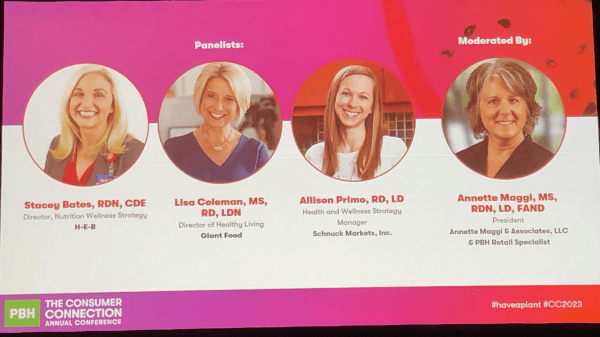SCOTTSDALE, AZ – Retail dietitians say produce prescription pilot programs at their stores show some promise and much potential.
At the Produce for Better Health Foundation’s BB #:157162 annual Consumer Connection Conference April 12, three retail dietitians said grocery stores are showing their value to consumer health, and one way has been produce prescriptions programs.
“We have a huge opportunity to impact behavior change with produce prescription plans because customers are in our stores, two, three, four times a week,” said Stacy Bates, director of nutrition strategy for HEB BB #:106490, compared to only a few visits to the doctor a year.
“We’re being resourced now like never before, and that’s where ‘food as medicine’ can take off,” she said.
“Grocery stores are part of health care ecosystems,” said Lisa Coleman, director of healthy living for Giant Food BB #:103652.
Annette Maggi, PBH retail specialist, said many retailers are doing produce prescription pilot programs, so she expects to see results of many of them this year. However, she said many retailers see them underperforming due to various barriers.
Allison Primo, health and wellness manager for Schnuck Markets BB #:105541, said overall health and wellness programs are showing they can provide return-on-investment and bring better health to their customers, and retail leaders are embracing them.
As to the barriers, all three dietitians said technology is a major factor.
Bates said retailers have to upgrade their technology so that they can accept the various cards of insurance providers.
Coleman agreed, saying her own mother uses a Medicare Advantage produce benefits program and Giant stores aren’t set up to accept it yet.
Primo said that since meal plans include fresh produce, it’s imperative that retailers allow all cards to be used.
Coleman said Giant isn’t hitting internal health incentive targets, and that’s creating urgency for the company executives to improve their numbers, and has improved communication between corporate, sales, and the health and wellness staff.
Another barrier to medically tailored meals, Bates says, is that they have to be designed to taste better, not just be healthy, and they need to be introduced incrementally.
“We can’t take [patients] from eating no lettuce to kale overnight,” she said.
Last year, the International Fresh Produce Association BB #:378962 named food as medicine and produce prescriptions among of its priorities, and it was released as a strategy at the White House Conference on Nutrition, Hunger and Health in September.
Mollie Van Lieu, Vice President of Nutrition and Health at IFPA, said earlier this year that “produce prescriptions – while not yet widespread – are already here, rooted in evidence, and represent an opportunity to grow fruit and vegetable consumption in ways we have not fully capitalized on yet.”



